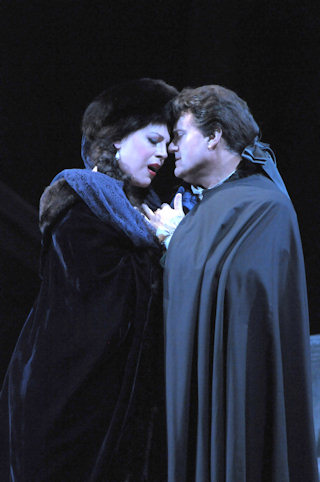Other Links
Editorial Board
- UK Editors
- Roger Jones and John Quinn
Editors for The Americas - Bruce Hodges and Jonathan Spencer Jones
European Editors - Bettina Mara and Jens F Laurson
Consulting Editor - Bill Kenny
Assistant Webmaster -Stan Metzger
Founder - Len Mullenger
Google Site Search
Verdi, Un ballo in maschera: Soloists, Chorus and Orchestra of Lyric Opera of Chicago, Ascher Fisch (conductor), Civic Opera House, Chicago, 27.11.2010 (JLZ).
Costume Designer: John Conklin
Lighting Designer: Christine Binder
Director: Renata Scotto
Choreographer: Denni Sayers
Chorus Master: Donald Nally
Conductor: Ascher Fisch
Cast:
Gustavo: Frank Lopardo
Amelia: Sondra Radvanovsky
Renato: Mark Delavan
Ulrica: Stephanie Blythe
Oscar: Kathleen Kim
Samuel: Craig Irvin
Count Horn: Sam Handley
Christian: Paul La Rosa
Judge: René Barbera
Amelia’s Servant: James Kryshak

Act Three, A MASKED BALL
The current production of Verdi’s Un ballo in maschera at Lyric Opera of Chicago offers a vivid presentation, originally staged by San Francisco Opera, and uses a conventional setting, in contrast to the modernist production that Lyric programmed several seasons ago. The plot concerns the tragic death of King Gustav III by the hand of his friend Renato, and the subsequent despair of Renato’s wife Amelia—who loves the King.
Visual cues reinforced the drama with an attractive evocation of the eighteenth century, and the action flowed well, even with the somewhat lengthy interval between the two scenes of the first act. Most importantly, the music is strong on all counts. The principals who played Gustavo and Amelia, Frank Lopardo and Sondra Radvanovsky, performed their roles exceptionally well. The veteran tenor Lopardo offered an attractive interpretation of Gustavo, with persuasive singing, both in the arias and also in the ensembles. Lopardo commanded the role both musically and dramatically, as expressed so well in the third-act, second-scene soliloquy,“Ma se m’è forza perderti.”
Likewise, Radvanovsky embodied the role of Amelia as if it were composed for her. Radvanovsky’s ease and facility were evident in how clearly she executed the fioritura passages, and maintained an even tone in all ranges. Her low pitches were as supple as her attractive upper ones. More than that, Radvanovsky phrased the music with a keen sense of both language and drama. The aria “Ma dall’arido stelo divulsa” at the opening of the second act was stunning, with impeccable and impassioned delivery. The subsequent duet with Lopardo (“Teco io sto”) brought the performance an emotional and lyrical core, a scene given an almost perfect reading. Radvanovsky was equally impressive in the third-act aria, “Morrò, ma prima in grazia,” Amelia’s response to her husband’s demand for her life. .

Sondra Radvanovsky as Amelia and Frank Lopardo as
Gustav
As the page Oscar, Kathleen Kim made her character come to life with her evocation of boyish innocence and enthusiasm—consistently convincing and matched by a polished execution of her solo arias. Yet as Renato, Gustavo’s close friend and Amelia’s husband, Mark Delavan was solid, but not as vibrant-sounding as Lopardo and Radvanovsky. His character’s soliloquy at the opening of the third act, “Eri tu,” was delivered powerfully, but lacked the nuance required.
Of the other characters, Stephanie Blythe, in her Lyric debut, was impressive as Ulrica, the alleged sorceress Gustavo takes his court to visit when he learns of legal proceedings to have the woman deported. As a foil for the events that follow, the scene sets up the somewhat reckless character of Gustavo, who dismisses Ulrica’s fateful pronouncements. Blythe played the role stylishly, with a well-considered sense of mystery. Resolute in warning Gustavo of the dangers that await him, Blythe subtly exposed the imminent conspirators in the king’s own court, using deft and fitting eye contact with Count Horn and Count Ribbing, played by Craig Irvin and Sam Handley.
In addition, Ascher Fisch, who has conducted at Lyric in
previous seasons, gave a reliable account of Verdi’s score with idiomatic tempos,
excellent pacing, and orchestral details evident from the start. With the
overture setting the tone, Fisch’s contributions helped make this outstanding
offering one of the current season’s high points.
James L. Zychowicz
Pictures © Dan Rest
